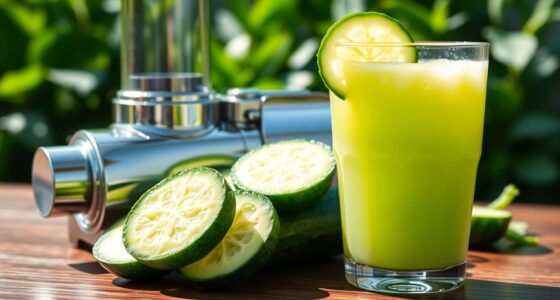Yes, you can drink orange juice during pregnancy, but make sure it's pasteurized. Pasteurized juice is safe and offers vital nutrients like vitamin C and calcium, which support your health and your baby's development. Avoid non-pasteurized juice, as it can carry foodborne illness risks. Limiting your intake to about 150 ml per day can help manage sugar consumption. For more insights on safe juice options and their benefits, keep exploring the topic.
Key Takeaways
- Pasteurized orange juice is safe to drink during pregnancy, while raw or freshly squeezed juice poses foodborne illness risks.
- It is high in vitamin C, which supports the immune system and aids iron absorption.
- Orange juice provides calcium, essential for the baby's bone and teeth development, and supports maternal bone health.
- Limit intake to about 150 ml per day to manage sugar consumption and balance with other food sources.
- Always check labels to ensure the juice is pasteurized, avoiding misleading "fresh" claims that could pose health risks.

When you're pregnant, you might wonder if drinking orange juice is safe for you and your baby. The good news is that orange juice can be a nutritious addition to your diet, as long as you stick to pasteurized varieties. Pasteurized orange juice is treated to eliminate harmful bacteria that can lead to foodborne illnesses, making it a safer choice during your pregnancy.
It's essential to avoid raw or freshly squeezed orange juice unless you're sure it has been pasteurized, since those can carry risks that you'd want to steer clear of.
One of the nutritional benefits of orange juice is its high vitamin C content. Vitamin C plays a crucial role in your immune system, which is especially important during pregnancy when your body is undergoing many changes. This vitamin also helps in the absorption of iron, which is vital for both you and your developing baby.
In addition to vitamin C, pasteurized orange juice provides a good amount of calcium. Calcium supports your baby's growing bones and teeth and helps maintain your bone health as well.
While orange juice can be beneficial, moderation is key. It's recommended to limit your juice intake to about 150 ml per day. This helps manage your sugar consumption while still allowing you to gain the nutritional benefits of the juice. Even though orange juice is natural, it can be high in sugars, and managing your blood sugar levels is essential during pregnancy.
Before you start or adjust your juice intake, consider discussing it with your healthcare provider. They can offer personalized advice based on your individual health needs and dietary restrictions.
It's always a good idea to check labels to ensure that any orange juice you buy is pasteurized. Some brands may promote their juice as "fresh," which can be misleading if it hasn't been pasteurized.
Frequently Asked Questions
Is It Safe to Drink Orange Juice During Pregnancy?
When you're considering drinking orange juice, it's important to ensure it's pasteurized.
Pasteurized juice eliminates harmful bacteria that could pose risks to you and your baby.
Besides that, orange juice offers essential nutrients like vitamin C and potassium, which can be beneficial during your pregnancy.
Just remember to limit your intake to about 150 ml a day to manage sugar consumption while still enjoying the health benefits.
Always check the labels!
What Juices Should Be Avoided During Pregnancy?
You might think all juices are safe, but that’s not the case. During pregnancy, you should avoid unpasteurized juices, as they can harbor harmful bacteria. Additionally, it’s important to choose juices that are high in essential nutrients, such as vitamin C and folate, which can support both your health and the development of your baby. Some of the best juice options during pregnancy include freshly squeezed orange juice and apple juice, as they provide vital vitamins while ensuring safety. Always check labels to ensure that the juices are pasteurized and free from additives for the healthiest choices.
Freshly squeezed juices from restaurants or markets often aren't pasteurized, increasing your risk of foodborne illnesses. Always ensure the juice is pasteurized, and steer clear of raw or cold-pressed varieties unless they've been boiled.
Thoroughly wash fruits and vegetables before juicing for added safety.
Is Orange Safe During the First Trimester?
Yes, orange is safe during the first trimester.
Just make sure you choose pasteurized options to avoid any harmful bacteria. Pasteurized orange juice provides essential vitamin C, which helps your immune system and aids in iron absorption.
However, it's wise to limit your intake to about 150 ml a day to manage sugar levels while still enjoying the health benefits.
Always check labels to confirm pasteurization for your safety.
What to Avoid During Early Pregnancy?
Think of your body as a garden during early pregnancy; you want to nurture it with the right things.
Avoid unpasteurized juices, as they're like weeds that can harm your blossoming life.
Steer clear of raw seafood, high-mercury fish, and undercooked meats, since they can bring illness.
Limit caffeine to 200 mg a day, and ditch alcohol entirely.
Conclusion
In conclusion, enjoying orange juice during pregnancy can be a refreshing and nutritious choice. Packed with vitamin C and folate, it can support both you and your growing baby. But, isn't it comforting to sip on something that not only tastes great but also nourishes? Just remember to choose fresh, pasteurized juice and enjoy it in moderation. With the right balance, you can savor this delicious drink while ensuring a healthy pregnancy journey!
Cindy thoroughly researches juicing trends, techniques, and recipes to provide readers with practical advice and inspiration. Her writing style is accessible, engaging, and designed to make complex concepts easy to understand. Cindy’s dedication to promoting the advantages of juicing shines through her work, empowering readers to make positive changes in their lives through the simple act of juicing.











